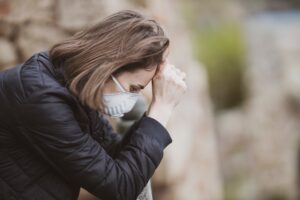Burnout, Depression and COVID Fatigue
As many areas of Canada are now in the third wave of the COVID-19 pandemic, it seems to be taking its toll on everyone, even more than it already had.
Perhaps in the first wave it was a novelty to Zoom and socialize via a screen? We’re fortunate to have this technology but we are also craving in-person connection.
Burnout is a term that has traditionally been used to describe the effects of too much stress in the workplace, but it seems as though burnout is now spreading to people’s everyday lives. For parents, there’s a lot of stress involved as they keep the house running and keep the spirits of their kids uplifted.
According to the World Health Organization, burnout involves feelings of intense fatigue, loss of control and accomplishing nothing at work. I believe there are many people having this experience in their day-to-day lives at home.
If you’re noticing that you start the day feeling exhausted, finding it hard to focus, not feeling a sense of satisfaction from your daily life and having more sugary foods, alcohol or other substances to numb these feelings, then it’s important to pay attention.
Burnout is different from depression but prolonged burnout can lead to depression.
Burnout versus Depression
According to the Centre for Studies on Human Stress, someone experiencing burnout produces less cortisol (the stress hormone), as if the body has gone on strike. On the other hand, a person experiencing depression produces too much cortisol which can affect their memory, and focus.
A person experiencing burnout may benefit from a weekend of complete rest or a mini vacation, but this is not helpful for a person struggling with depression.
It’s important for a person struggling with depression to seek counselling support from a licensed mental health professional.
They may also benefit from medication. Deciding to use medication to help treat depression is a very personal choice. Some people are vehemently opposed, whereas others believe there may be a chemical imbalance that needs treating. For others, the individual is spiralling downward and other options are not helping enough, so medication now seems to be worth a try. I have met families who have felt that medication has been very effective and lifted the fog for their child/teen, and for others, they have not found it to be effective.
Genetic Testing for Anti-Depressant/Anti-Anxiety Medication
If you are considering anti-depressant/anti-anxiety medication, I think it’s important to know that genetic testing is available to help determine the best medication for an individual’s gene type. One can order a 23 and Me saliva genetic test kit online. Once you have the results from 23 and Me you can ask them for the raw data at no extra charge. You can then upload the raw data to Nutrahacker (an online site) and pay for a depression report based on this raw genetic data. Nutrahacker will then provide a report/graph which you can interpret for yourself or you can enlist the services of a professional to help you understand it. (Dr. Brian Davies, a naturopath in North Vancouver, is well-versed in understanding these reports.)
Light Therapy to Elevate Mood
In addition, light therapy is a recommended natural form of therapy to help elevate mood. According to the Mayo Clinic, “Light therapy is thought to affect brain chemicals linked to mood and sleep, easing SAD (Seasonal Affective Disorder) symptoms. Using a light therapy box may also help with other types of depression, sleep disorders and other conditions.” There are different devices one can order online, including ones which have an alarm clock, so that you can set it to start working 30-40 minutes before your regular wake-up time, to create consistency of having the light therapy every morning.
Forest Bathing and the Powerful Effects of Nature
In addition, connecting with nature is one of the best ways to feel better. According to this article on Health Harvard:
“It appears that interacting with natural spaces offers other therapeutic benefits. For instance, calming nature sounds and even outdoor silence can lower blood pressure and levels of the stress hormone cortisol, which calms the body’s fight-or-flight response.”
Forest-bathing (Shinrin-Yoku) is a term that originated in Japan. It is the practice of walking through woods or sitting under a canopy of trees. This study summarizes the wide range of health benefits from forest bathing, including decreased stress, improved mood states, a variety of mental health benefits, improved energy, reduced fatigue and feelings of appreciation.
During the pandemic, many people have discovered the importance of being in nature to keep them feeling grounded. It is recommended to spend at least 30 minutes at least three times/week in nature to feel the health benefits. This is something that most of us hopefully can still do, with our kids, even during a pandemic.
Sending “air hugs” during these difficult times,
Warmly,

PS. Registration is now open for my next round of online “Brain Science” groups to teach 7-9 year olds and 10-12 year olds about anxiety/worry and anxiety management strategies. Groups start May 18th, 2021. To find out more and to register, please click here.
PPS. If your child is age 5-10 years and having a lot of worries or anxiety, you may wish to purchase my children’s book: Surfing the Worry Imp’s Wave, to help them understand the worries and how to manage them.
Want to Connect?
Subscribe now to receive free weekly parenting tips and inspiration.







